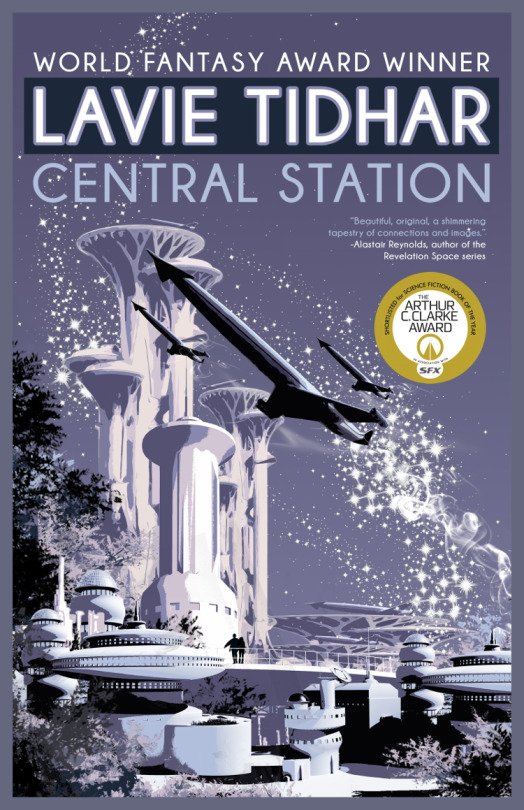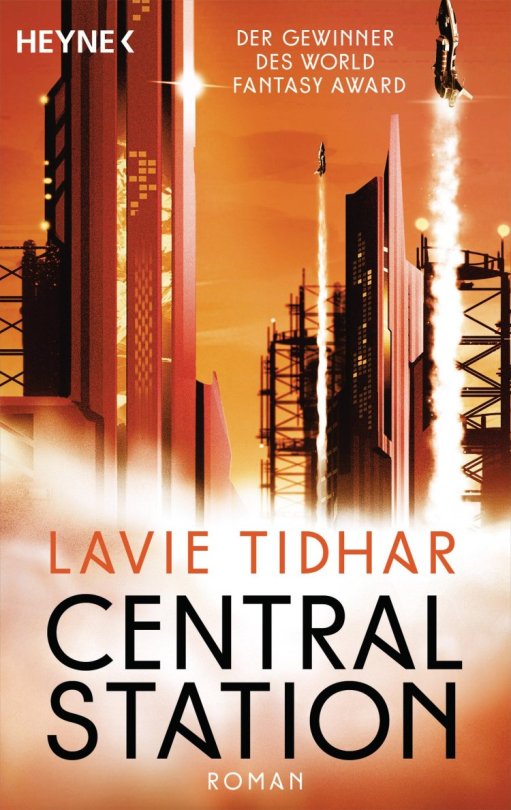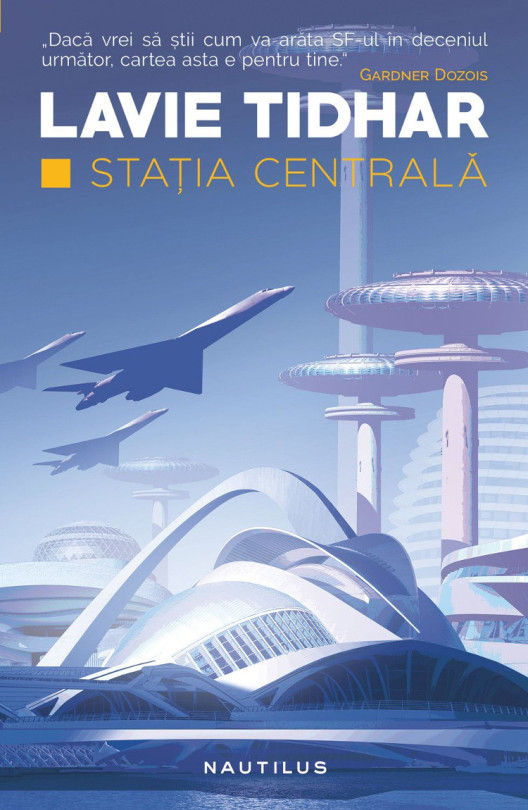Lavie Tidhar’s CENTRAL STATION is the justified winner of the John W. Campbell Memorial Award
With a pair of German reviews and one Romanian, Lavie Tidhar’s CENTRAL STATION continues to wow the world.

Tobias Schäfer on the German site BUCHWURM praises the novel.
For me, this is the central essence of the novel: the presentation and examination of this interconnectedness, to which even we in the real world are heading with great strides. Tidhar writes no horror scenarios with eye-opening hammer blows, but he tells a quiet, impressively positive story, between whose obvious feel-good scenes hides the message that makes such a networked society so disturbing – and in their extrapolative retrospective our current development has the goal. Tidhar writes that down in such small, inconspicuous sentences, but that’s what gets me the most from the story.
More obvious is his subversive way of mingling with the classics of the genre. The book hails in the book only from small word structures, places and events that can be understood as reminiscences. Frederik Pohl, William Gibson, Philip K. Dick – just to name the most obvious.
<snip>
Linguistically, stylistically and in terms of the splendor of ideas, but also through the subtle message, this book is the justified winner of the John W. Campbell Memorial Award – but not, as the title suggests, the World Fantasy Award . The latter received Lavie Tidhar for his novel Osama.
I think, overall, I really liked the book.

At SL LESELUST, Carsten Kuhr enjoys the book.
Well, a single work, a novel that does not once present the Americans, Russians or Europeans as conquerors of the universe, but Africans and Asians together with Arabs and Israelis in the center.
So far I have not read that, so a whole new world opened up for me here. What’s more, Lavie Tidhar, who was a guest at the ElsterCon in Leipzig a few years ago, is pouring out a wealth of ideas about the recipient. Characters, ideas and unusual, fascinatingly different images determine the novel. Tidhar tells us about wars and their mechanical mercenaries, about lonely robotniks, about people looking for a hold, about a religion, about fulfillment and luck.
<snip>
Is CENTRAL STATION a good book or a bad book? That depends on what expectation the reader approaches the text. If you are looking for exciting action, this is definitely the wrong address. But those who are looking for ideas, unfamiliar insights into foreign cultures and a convincing future drawing, will find here a whole bunch of ideas.

The Romanian site BLOG-UL FANULUI SCIENCE FICTION lauds the Campbell Award winning work.
The atmosphere in the CENTRAL STATION is rather dark and sad, I had to say this from the very beginning. And the book is a combination of cyberpunk and hard-SF of the real, full of zorzoans and militarized gadgets, which lead you to the endless wars, from which only the generals with many stars in the epaulettes win. So, all the premises do not like the story. It would not be helped by the fact that we do not have a coherent story, because the whole book is actually a chain of short or long stories (some two have almost the length of short stories) with different characters, they only meet on the run, without having time to build something that stands solid. However, Tidhar succeeds, with all his stinginess in detail, to build one of the most solid post-human world I have ever encountered. And keep in mind, it does in just two hundred pages of pages through stories.
But his imagination is so rich, the characters so shattered and the situations so painfully familiar that you just fall in love with this decadent, sad, gloomy world and, at the same time, rattling with life. The message has been clear and I have met him many times (the clearest thing is the example of Walter M. Miller’s “Cantika for Leibowitz” masterpiece, which won only one Hugo award at its time – it is true that then, in the sixties, there were far fewer awards): humanity is condemned to repeat its mistakes, which, eventually, will probably lead to its extinction. But the messages that ran out among the rows, though not veiled, are quite like this: what is happening now between Palestinians and Jews will not lead to a peace deal too soon. Interethnic and inter-religious conflicts can not disappear where there is no will, but only stubborn and increasingly destructive weapons. Soldiers returning from the front or from the battering war theaters will not get rid of trauma overnight. Those caught in the middle of such conflicts are all innocent.Terrorists will not just disappear because technology is advancing as long as their obsolete mentalities remain the same, and the money that feeds all conflicts is still flowing into the streams.
In my opinion, the extremely diverse characters and their life stories are the strength of the book, putting even in the shadow the newly created world in its entirety, about which we do not get to know very much: we are somewhere in the future, mankind has come to the stars, has a race of aliens with no noble intentions, has colonized planets and satellites, has changed itself (those who naturally wanted) beyond any barriers, and the Jews of Tel Aviv are fighting continuing with the Palestinians and their eternal neighbors dissatisfied with the oasis called Israel in a sea of fanatical Islamists. An impure summary, of course, that fails to reach even the knee of the frog in an attempt to make your world more familiar to the CENTRAL STATION populated by robotniki beggars looking for spare parts to be able to drag on tattoos, vampires, saints walking among humans, creators of gods, telly, oracles, grandparents, genetic engineers, ship pilots in virtual worlds in love with cyborgers returning to battle trauma, book merchants , robotic rabbis, preachers, and many, many others.
(All translations courtesy of Google)
For more info about CENTRAL STATION, visit the Tachyon page.
Cover by Sarah Anne Langton
